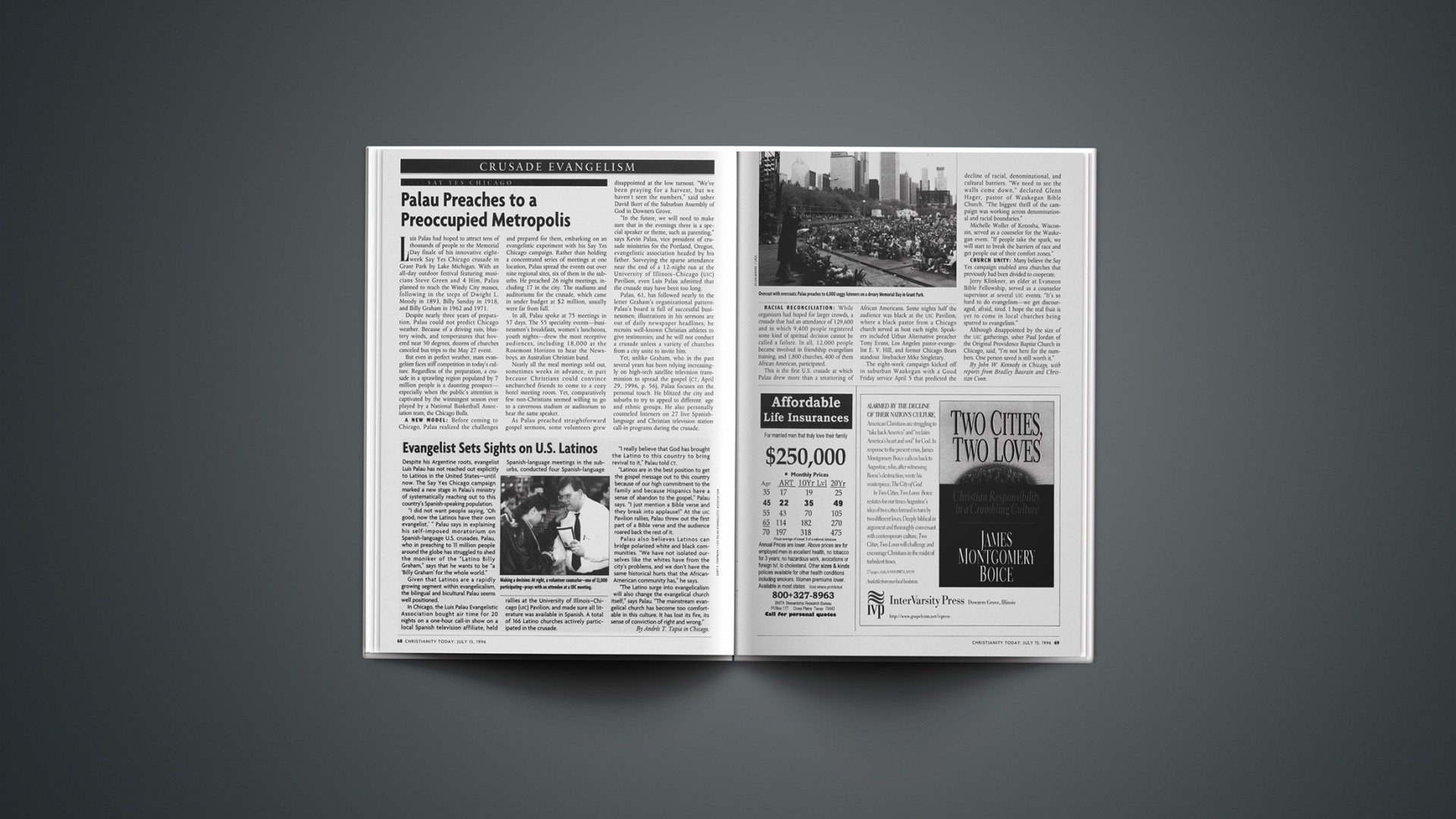Luis Palau had hoped to attract tens of thousands of people to the Memorial Day finale of his innovative eight-week Say Yes Chicago crusade in Grant Park by Lake Michigan. With an all-day outdoor festival featuring musicians Steve Green and 4 Him, Palau planned to reach the Windy City masses, following in the steps of Dwight L. Moody in 1893, Billy Sunday in 1918, and Billy Graham in 1962 and 1971.
Despite nearly three years of preparation, Palau could not predict Chicago weather. Because of a driving rain, blustery winds, and temperatures that hovered near 50 degrees, dozens of churches canceled bus trips to the May 27 event.
But even in perfect weather, mass evangelism faces stiff competition in today’s culture. Regardless of the preparation, a crusade in a sprawling region populated by 7 million people is a daunting prospect–especially when the public’s attention is captivated by the winningest season ever played by a National Basketball Association team, the Chicago Bulls.
A NEW MODEL: Before coming to Chicago, Palau realized the challenges and and prepared for them, embarking on an evangelistic experiment with his Say Yes Chicago campaign. Rather than holding a concentrated series of meetings at one location, Palau spread the events out over nine regional sites, six of them in the suburbs. He preached 26 night meetings, including 17 in the city. The stadiums and auditoriums for the crusade, which came in under budget at $2 million, usually were far from full.
In all, Palau spoke at 75 meetings in 57 days. The 55 speciality events–businessmen’s breakfasts, women’s luncheons, youth nights–drew the most receptive audiences, including 18,000 at the Rosemont Horizon to hear the Newsboys, an Australian Christian band.
Nearly all the meal meetings sold out, sometimes weeks in advance, in part because Christians could convince unchurched friends to come to a cozy hotel meeting room. Yet, comparatively few non-Christians seemed willing to go to a cavernous stadium or auditorium to hear the same speaker.
As Palau preached straightforward gospel sermons, some volunteers grew disappointed at the low turnout. “We’ve been praying for a harvest, but we haven’t seen the numbers,” said usher David Ikert of the Suburban Assembly of God in Downers Grove.
“In the future, we will need to make sure that in the evenings there is a special speaker or theme, such as parenting,” says Kevin Palau, vice president of crusade ministries for the Portland, Oregon, evangelistic association headed by his father. Surveying the sparse attendance near the end of a 12-night run at the University of Illinois-Chicago (UIC) Pavilion, even Luis Palau admitted that the crusade may have been too long.
Palau, 61, has followed nearly to the letter Graham’s organizational pattern: Palau’s board is full of successful businessmen; illustrations in his sermons are out of daily newspaper headlines; he recruits well-known Christian athletes to give testimonies; and he will not conduct a crusade unless a variety of churches from a city unite to invite him.
Yet, unlike Graham, who in the past several years has been relying increasingly on high-tech satellite television transmission to spread the gospel (CT, April 29, 1996, p. 56), Palau focuses on the personal touch. He blitzed the city and suburbs to try to appeal to different age and ethnic groups. He also personally counseled listeners on 27 live Spanish-language and Christian television station call-in programs during the crusade.
RACIAL RECONCILIATION: While organizers had hoped for larger crowds, a crusade that had an attendance of 129,600 and in which 9,400 people registered some kind of spiritual decision cannot be called a failure. In all, 12,000 people became involved in friendship evangelism training, and 1,800 churches, 400 of them African American, participated.
This is the first U.S. crusade at which Palau drew more than a smattering of African Americans. Some nights half the audience was black at the UIC Pavilion, where a black pastor from a Chicago church served as host each night. Speakers included Urban Alternative preacher Tony Evans, Los Angeles pastor-evangelist E. V. Hill, and former Chicago Bears standout linebacker Mike Singletary.
The eight-week campaign kicked off in suburban Waukegan with a Good Friday service April 5 that predicted the decline of racial, denominational, and cultural barriers. “We need to see the walls come down,” declared Glenn Hager, pastor of Waukegan Bible Church. “The biggest thrill of the campaign was working across denominational and racial boundaries.”
Michelle Woller of Kenosha, Wisconsin, served as a counselor for the Waukegan event. “If people take the spark, we will start to break the barriers of race and get people out of their comfort zones.”
CHURCH UNITY: Many believe the Say Yes campaign enabled area churches that previously had been divided to cooperate.
Jerry Klinkner, an elder at Evanston Bible Fellowship, served as a counselor supervisor at several UIC events. “It’s so hard to do evangelism–we get discouraged, afraid, tired. I hope the real fruit is yet to come in local churches being spurred to evangelism.”
Although disappointed by the size of the UIC gatherings, usher Paul Jordan of the Original Providence Baptist Church in Chicago, said, “I’m not here for the numbers. One person saved is still worth it.”
Copyright © 1996 Christianity Today. Click for reprint information.










